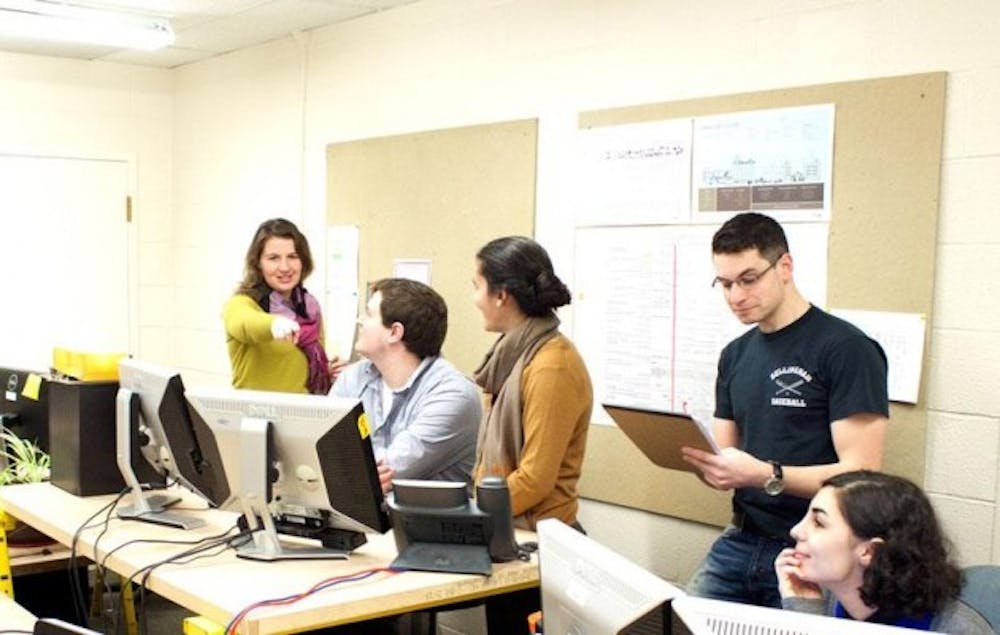It's easy to miss the Hayes A. Annex building on South Campus. The small aluminum-sided warehouse, nestled in between Diefendorf Hall and the Health Sciences Library, resembles more of a temporary construction site than a research lab with a nationally award-winning staff.
Yet according to the staff of the Food Systems Planning and Healthy Communities Lab, or the "Food Lab," the research being conducted in the facility is anything but quaint. It is aiming to reinvent the way urban centers function across the country.
The Food Lab "conducts research, builds capacity of planners through education and training, and engages in community-based efforts to build sustainable food systems and healthy communities," according to its website.
Researchers at the Food Lab believe there is an opportunity to lead the professional community into the next generation of urban structuring. They think using smart planning as a way to address one of the most critical issues facing urban and rural communities - an inaccessible food market for the poor and underprivileged - could be effective.
Maryam Khojasteh, a master's of urban planning student and employee of the lab, said planning with public health and accessible food systems in mind is essential when it comes to proper city development. This, however, is a lacking quality in many modern planning techniques.
"There is so much research that has been done about the discrimination or special distribution of food that shows that there are so many issues with food access that cannot be tackled really easily because they are so complicated in a way that class, gender or race is tied together," Khojasteh said. "It needs an interdisciplinary effort by every different field and major to be able to actually address this issue properly."
Bringing together undergraduate students, graduate students and Ph.D candidates, the Food Lab is a congregation of educators and professionals that each contribute unique skill sets and experiences. Project Coordinator Jeanne Leccese is among them.
As the head of the "Growing Food Connections" program, Leccese stresses the importance of creating sustainable food communities. Her hope is that these food systems will not only address the hunger issues that threaten lower-income communities, but also benefit the surrounding agriculture industry and local economies.
"The food system that we have now is industrialized," Leccese said. "It's aggregated across the country, across the world, and we have lost our connection to food and it's one of our basic needs as humans.
"We don't know where our food comes from anymore. It's bringing our food back to the local level. There is a lot of power that can come from accessing healthy food and there's ways to do it that are supporting and inclusive of everyone in our communities."
The Food Lab focuses on localism, policy-making and healthy neighborhoods. It contributed to the school's first Ph.D. program in urban and regional planning, the only one in the SUNY system and the nation's first graduate program with a specialty in food system planning.
Jenny Whittaker, a master's of urban planning student, hopes this will be a step forward in decreasing worldwide hunger - something she says is doable.
"We are partially interested in production of food but even more interested in how people access food because we produce a lot of food so why do we still have people hungry," Whittaker said. "A lot of the planning profession that comes into it is how people access it and how it gets distributed and the pathways to food, starting where it starts and actually reaching the right people at the right place, at the right price."
Dr. Samina Raja, the principle investigator of the Food Lab, won the Dale Prize for Excellence in Urban and Regional Planning, a national award. Raja said she is confident in her team. Her students and the faculty have been an inspiration for her.
"I wish I could take credit for having a brilliant moment when I thought of a lab - nothing like that happened. It was an incremental process," Raja said in email. "I am proudest of the learning, both among our students and the broader community, and on-the-ground policy change that is fueled by the lab's research."
It has partnered with the federal agency Housing and Urban Development (HUD), a local urban revitalization group, One Region Forward, and the nationally recognized Safe Routes to School.
Whittaker said the City of Buffalo is ranked third poorest nationally. The metropolitan's segregated communities, combined with the poverty, is something that will take time to overcome, according to Khojasteh.
"We have our work cut out for us. There is a lot of good work that can be done here," Leccese said.
For the staff, the Food Lab is a family - the center table a meeting place for conversation, brainstorming and community conversation. Sprinkled with shared fruit slices, papers and peanuts, there is more in store for the lab behind the doors of the plain building.
With research a stepping point toward a new future in urban planning and community development, the team is driven to eliminate hunger sustainably, effectively and nationally.
email: news@ubspectrum.com





